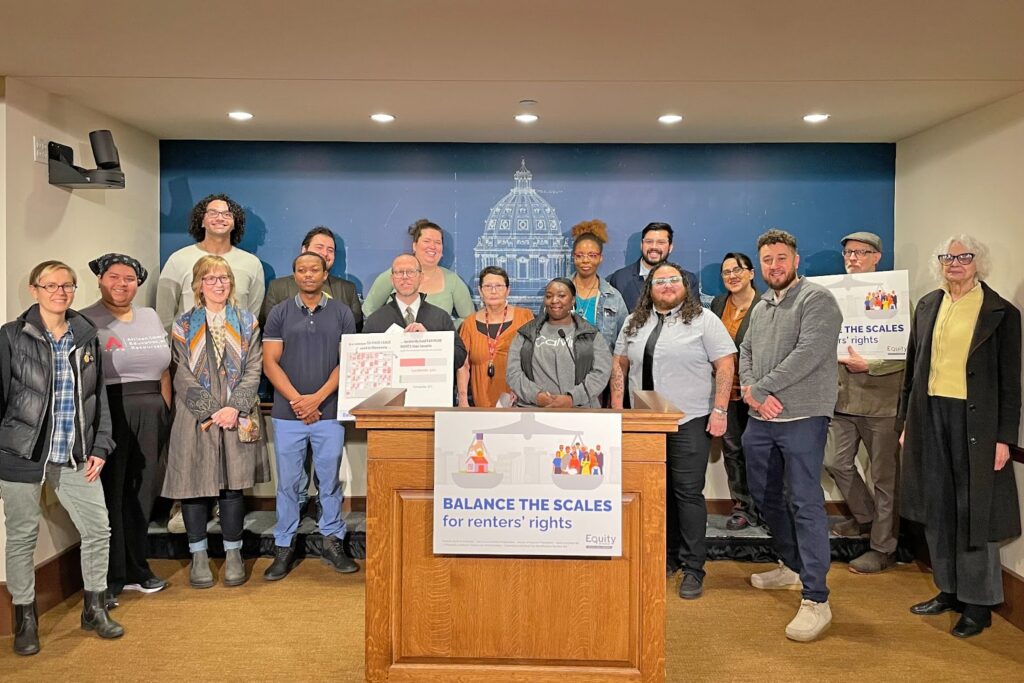SAINT PAUL — While many important bills stalled in the tumultuous 2024 legislative session, advocates secured two critical wins with the passage of Renters’ Right to Organize (HF 2704, SF 3201) and One Minnesota Economy (SF 3769, HF 3843). These bills will have a transformative impact on renter households across Minnesota now and for generations to come. The two new laws were championed by the Equity in Place and Vida Digna coalitions, and will ignite, accelerate and protect Minnesota’s growing movement to ensure dignified housing for all.
From Mankato to Rochester, from Brooklyn Center to the West Side of Saint Paul, renters are coming together to identify common concerns, and play a central role in solving Minnesota’s housing crisis. For decades, many undocumented and mixed-status Minnesota families have been sidelined from the movement by the widespread requirement for Social Security numbers in rental housing applications, which push them into unsafe and unstable living situations. Meanwhile, tenants of all backgrounds who have come together to organize around rent increases or maintenance concerns have been undermined and retaliated against by landlords with unreasonable and unchecked power.
With the passage of Renters’ Right to Organize and the One Minnesota Economy bill, tenants across race, place and income will have the power and protection they need to build a massive, multi-racial movement for housing justice.
“New ITIN legislation will ensure that families have a pathway to rent, regardless of immigration status,” said Ryan Pérez, Organizing Director at COPAL, which is part of the Vida Digna coalition. “This will create new opportunities for dignified housing, especially in Greater Minnesota.”
“The new Tenant’s Right to Organize law will ensure that all renters across the state have legally protected pathways to come together and organize for better living conditions and housing justice,” said Juan Luis Rivera-Reyes, coalition organizer at The Alliance, which convenes the Equity in Place coalition. “In tandem with the ITIN law and other tenant-landlord law reforms, we have more collective power to build strong communities and advance bold visions from renters across Minnesota.”
Tenant Right to Organize provides guarantees to tenants, non-resident organizers, and advocates to defend renters’ rights to dignified, well-maintained housing without facing retaliation and displacement. For tenants like Jean Flores, a Native American grandmother and renter in an affordable housing community in Spring Lake, this new protection will be transformative.
“Many of my neighbors and friends are immigrants from the East African community, who moved to Minnesota to escape civil war,” Flores said. “As a tenant leader, I know this community is especially afraid of retaliation, as they see what happens to their neighbors who are actively organizing and they are afraid of losing their new life in Minnesota. Having an affirmative tenant right to organize will support the multi-cultural organizing and relationships that make our lives better and our communities stronger.”
“A strong community is built on the foundation of empowered individuals,” said Rep. María Isa Pérez-Vega, the lead bill author. “Just as a healthy democracy thrives on collective participation, a thriving tenant population has the right to organize and advocate for their well-being. This right to organize is not a privilege, but a cornerstone of a just and equitable living environment.”
The One Minnesota Economy bill expands the use of the Individual Taxpayer Identification Number (ITIN) for rental and utility applications, formalizing an avenue for undocumented taxpayers to rent housing across the state. For Anahí Sánchez, that means other immigrant families won’t have to endure living in unsafe and inadequate housing like she did.
“For 10 years, my family of five lived in a small one-bedroom apartment because it was the only affordable option we had,” Sánchez said. “When mold spread over our walls, the landlord dismissed our concerns and put our health at risk for nearly a decade. During those 10 years, we tried searching for a new home but weren’t able to find one because of the requirement for a social security number to apply. My parents are ITIN holders and longtime taxpayers, it is unfair and unjust that their housing options were so limited simply because they have an ITIN. This law will result in healthier, safer, and more stable communities for everyone who calls Minnesota home.”
A lot more must happen to fully balance the scales of power between renters and landlords, including source of income and just cause eviction protections. While there is still work to be done, these essential changes, coupled with major tenant protections secured in 2023, put Minnesota at the forefront of the national movement for housing justice.
Equity in Place is a Twin Cities-based coalition centering the expertise and power of people of color to uproot policies that create racial inequity — and ensure our communities have choice, agency and self-determination in where they live and what their neighborhoods look like.
Composed of Latine organizations COPAL, HACER, and LatinoLEAD, the Vida Digna Coalition promotes policies and actions aimed at improving the quality of life for all individuals, regardless of their immigration status, fervently advocating for inclusion and equitable access to essential services and economic opportunities for everyone.




